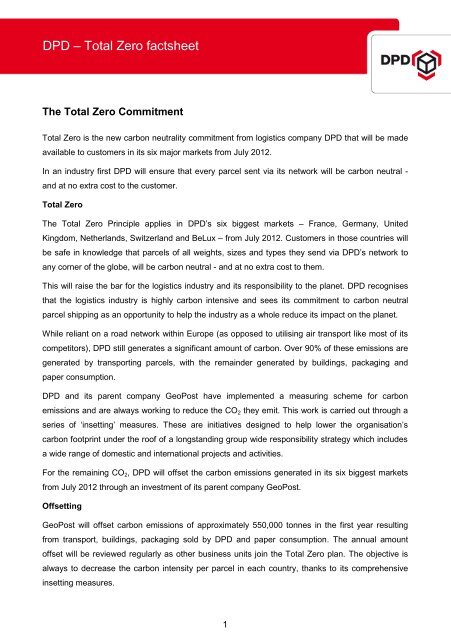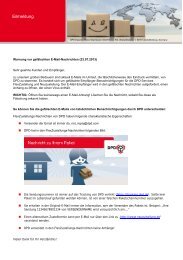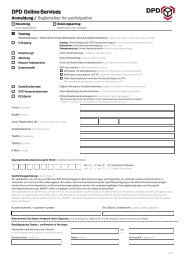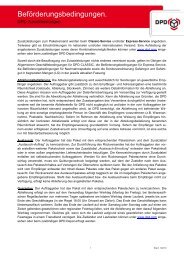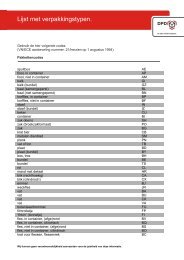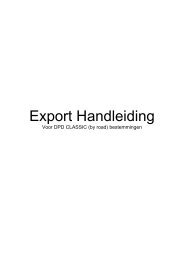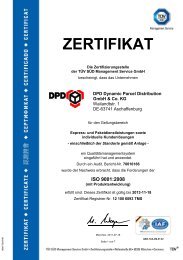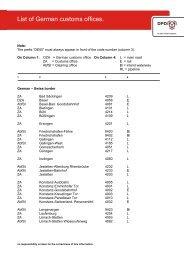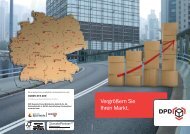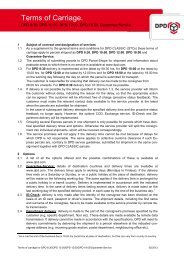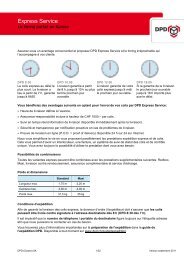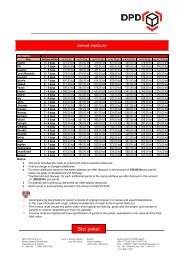You also want an ePaper? Increase the reach of your titles
YUMPU automatically turns print PDFs into web optimized ePapers that Google loves.
<strong>DPD</strong> <strong>–</strong> <strong>Total</strong> <strong>Zero</strong> <strong>factsheet</strong><br />
The <strong>Total</strong> <strong>Zero</strong> Commitment<br />
<strong>Total</strong> <strong>Zero</strong> is the new carbon neutrality commitment from logistics company <strong>DPD</strong> that will be made<br />
available to customers in its six major markets from July 2012.<br />
In an industry first <strong>DPD</strong> will ensure that every parcel sent via its network will be carbon neutral -<br />
and at no extra cost to the customer.<br />
<strong>Total</strong> <strong>Zero</strong><br />
The <strong>Total</strong> <strong>Zero</strong> Principle applies in <strong>DPD</strong>‟s six biggest markets <strong>–</strong> France, Germany, United<br />
Kingdom, Netherlands, Switzerland and BeLux <strong>–</strong> from July 2012. Customers in those countries will<br />
be safe in knowledge that parcels of all weights, sizes and types they send via <strong>DPD</strong>‟s network to<br />
any corner of the globe, will be carbon neutral - and at no extra cost to them.<br />
This will raise the bar for the logistics industry and its responsibility to the planet. <strong>DPD</strong> recognises<br />
that the logistics industry is highly carbon intensive and sees its commitment to carbon neutral<br />
parcel shipping as an opportunity to help the industry as a whole reduce its impact on the planet.<br />
While reliant on a road network within Europe (as opposed to utilising air transport like most of its<br />
competitors), <strong>DPD</strong> still generates a significant amount of carbon. Over 90% of these emissions are<br />
generated by transporting parcels, with the remainder generated by buildings, packaging and<br />
paper consumption.<br />
<strong>DPD</strong> and its parent company GeoPost have implemented a measuring scheme for carbon<br />
emissions and are always working to reduce the CO2 they emit. This work is carried out through a<br />
series of „insetting‟ measures. These are initiatives designed to help lower the organisation‟s<br />
carbon footprint under the roof of a longstanding group wide responsibility strategy which includes<br />
a wide range of domestic and international projects and activities.<br />
For the remaining CO2, <strong>DPD</strong> will offset the carbon emissions generated in its six biggest markets<br />
from July 2012 through an investment of its parent company GeoPost.<br />
Offsetting<br />
GeoPost will offset carbon emissions of approximately 550,000 tonnes in the first year resulting<br />
from transport, buildings, packaging sold by <strong>DPD</strong> and paper consumption. The annual amount<br />
offset will be reviewed regularly as other business units join the <strong>Total</strong> <strong>Zero</strong> plan. The objective is<br />
always to decrease the carbon intensity per parcel in each country, thanks to its comprehensive<br />
insetting measures.<br />
1
<strong>DPD</strong> <strong>–</strong> <strong>Total</strong> <strong>Zero</strong> <strong>factsheet</strong><br />
<strong>DPD</strong> shareholder GeoPost has partnered with CDC Climat to manage its offsetting work. CDC<br />
Climat is a subsidiary of Caisse des Dépôts (a French financial organisation dedicated to long term<br />
investment), with over 10 years‟ experience of combatting climate change. It invests in carbon<br />
assets either directly, or in the form of innovative carbon funds open to long-term investors aimed<br />
at reducing CO2 emissions by 60 million tonnes for 2014.<br />
<strong>DPD</strong> shareholder GeoPost is working with CDC Climat to identify a range of carbon offsetting<br />
projects which it will support via the <strong>Total</strong> <strong>Zero</strong> principle. The amount of greenhouse gas (GHG)<br />
emissions reduced thanks to these projects is translated into carbon credits. Carbon reduction<br />
projects that <strong>DPD</strong> will support include: transforming alfalfa-feed production in France; bringing<br />
biodigesters to rural farming communities in Cambodia; and reforestation and habitat restoration in<br />
Columbia. All projects are certified with globally recognised carbon standards and each deliver<br />
significant socio-economic benefits as well as environmental improvements. Apart from these<br />
projects, GeoPost supports other offset initiatives certified by best in-class standards, and in other<br />
regions of the world<br />
Insetting<br />
<strong>DPD</strong> already has an advantage over its competitors in terms of its commitment to lower its carbon<br />
footprint by using the <strong>DPD</strong> road network to transport nearly all of its parcels. <strong>DPD</strong>‟s ECO calculator<br />
demonstrates that sending parcels by road within Europe produces up to eight times less CO2 than<br />
if sent by air (see www.whyflyparcels.com for more information).<br />
However, <strong>DPD</strong> aims to go further and is looking at every aspect of its business to reduce CO2<br />
emissions year-on-year. Insetting initiatives currently helping to reduce <strong>DPD</strong>‟s carbon footprint<br />
include for example:<br />
� The introduction of Compressed Natural Gas vans, which run entirely on natural gas in<br />
Belgium and the Netherlands;<br />
� Using delivery bikes and electric vehicles instead of small diesel vans in Germany<br />
(Hamburg / Stuttgart);<br />
� Using rail instead of road to transport parcels in Germany;<br />
� Reducing energy consumption in Chronopost buildings across France by using<br />
automatic light switches and locking thermostats;<br />
� Favouring renewable energies like photovoltaic cells and wind turbines in all new depots<br />
of Exapaq in France;<br />
2
<strong>DPD</strong> <strong>–</strong> <strong>Total</strong> <strong>Zero</strong> <strong>factsheet</strong><br />
� Using “Chrono Bikes” and electric vehicles for deliveries by Chronopost in many French<br />
cities;<br />
� Reducing energy consumption by measures like motion detector light switches, energy<br />
efficient light bulbs and awareness campaigns in Belgium and UK;<br />
� Using electric vehicles, Natural Gas vans and Bicycles for deliveries of Exapaq in many<br />
French cities;<br />
� Eco-driving trainings for delivery drivers and the „Drive Smart‟ campaign in UK to raise<br />
awareness for Eco-driving;<br />
All these activities help <strong>DPD</strong> reduce its carbon footprint making it even more environmentally<br />
responsible. <strong>DPD</strong>‟s mother company La Poste is the first postal operator to ensure total carbon<br />
neutrality of its domestic and international mail and parcel offerings, at no charge for the customer.<br />
About <strong>DPD</strong><br />
With the shipment of 2.5 million parcels a day <strong>DPD</strong> is a leading international provider of parcel and<br />
express services. The company has the most efficient road network in Europe and delivers to 230<br />
countries worldwide. Customers can choose services from an extensive product range of national<br />
and international parcel and express services for business and home deliveries. A workforce of<br />
24,000 and 18,000 vehicles operate at more than 800 locations. The majority shareholder in <strong>DPD</strong><br />
with 83,32 % shareholding is the GeoPost Group, a wholly-owned subsidiary of French Groupe La<br />
Poste. With a consolidated turnover of 3.440 billion euros in the year 2010 GeoPost is currently<br />
Europe's second-largest provider of express parcel services. .<br />
3


